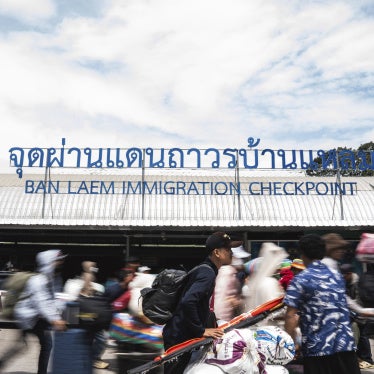(New York)—The Thai government should not force a renowned health clinic on the Thai-Burma border to close or deport its predominantly ethnic Karen staff to Burma where they could face persecution, Human Rights Watch said today. In an apparent attempt to appease the military government in Burma, Thai authorities on September 29 ordered Dr. Cynthia Maung and her staff of more than 100 medics and teachers at the Mae Tao Clinic in Mae Sot to prepare for deportation.
Dr. Cynthia runs a desperately needed humanitarian medical clinic along the Thai-Burma border. Last year, she was honored with the prestigious Ramon Magsaysay Award, created and funded by the Rockefeller Brothers Fund of New York, for community leadership. Medics and teachers at the clinic had work permits that expired on September 25 after Thailand´s cabinet passed a resolution in August prohibiting more than 12,000 alien workers from renewing their work permits.
“If deported to Burma, Dr. Cynthia and her staff—most of whom are ethnic Karens—would face a serious risk of arbitrary detention and mistreatment by Burma´s brutal military government,” said Brad Adams, executive director of Human Rights Watch´s Asia Division.
Thailand is prohibited under customary international law from returning persons to a country where they would face persecution (refoulement).
Human Rights Watch expressed concern that the ruling State Peace and Development Council (SPDC) in Burma would single out Dr. Cynthia and Mae Tao Clinic workers because they provide health and other services to individuals fleeing persecution in Burma. The SPDC has in the past called Dr. Cynthia and her staff “absconders, insurgents and terrorists.”
Human Rights Watch called on Thai Prime Minister Thaksin Shinawatra to put humanitarian and human rights concerns above apparent efforts to appease a government in Rangoon that has ruled Burma by force for over 40 years.
“Thailand should support the efforts of those trying to help victims of the military government in Burma rather than put them in danger or threaten them with legal sanctions,” said Adams. “Why is the Thai government threatening to crack down on vulnerable humanitarian workers who have done nothing more than help sick people?”
In 1988, Dr. Cynthia founded the Mae Tao Clinic in Mae Sot in northwestern Thailand, after she escaped from Burma. Since then, the clinic has tended to the medical needs of Burmese refugees living in Thailand. Without the clinic, many people in the area would have no access to medical care. The clinic treats as many as 150 patients each day. Clinic doctors also train volunteer “backpack medics,” who cross the border to provide vital medical assistance to villagers in Burma.
“Closing the Mae Tao Clinic would also threaten its patients´ right to health,” said Adams. “It is highly unlikely that any other agency would offer health services to this population if the clinic is closed.”
Thailand is a party to the International Covenant on Economic, Social and Cultural Rights, which states that everyone has a right to the highest attainable standard of health. Forcing the clinic to close without providing an alternative source of medical care would violate Thailand´s obligations under the treaty.
Human Rights Watch and other organizations have reported widespread abuses by the Burmese military, particularly in border areas where non-Burman ethnic groups predominate. Villages are often destroyed, and the residents forced to relocate. The army regularly requires villagers to provide unpaid labor, such as in building roads or working as porters for soldiers. Residents of Burma´s seven ethnic states face the constant threat of arbitrary detention, torture, rape and murder by the military.
As many as two million Burmese citizens reside in Thailand. Approximately 125,000 live in camps near the Burmese border, but the rest are classified by Thailand as “illegal immigrants.” Thailand has not signed the 1951 Refugee Convention, and has no legal process to determine whether immigrants face a well-founded fear of persecution in Burma, which would entitle them under international law to protection as refugees.








